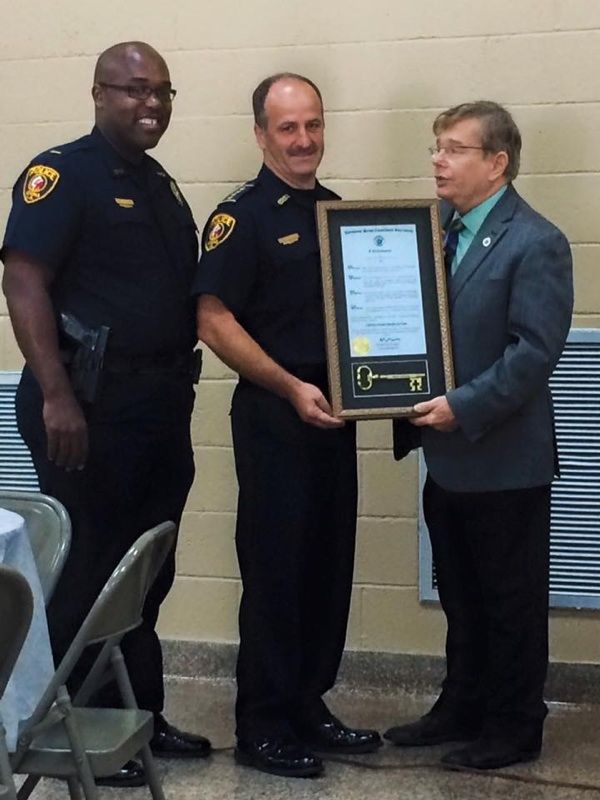
MMA coming to Cut Off Youth Center
July 22, 2015
BREAKING: Alleged gunman killed by officers
July 27, 2015When a lieutenant named Todd Duplantis was elevated to the position of chief at the Houma Police Department in 2008, tongues wagged and heads shook at the agency’s Honduras Street headquarters.
Internal departmental rivalries, controversy surrounding the agency and the tenure of his predecessor and other factors portended a bumpy start for Duplantis. His retirement announcement came on the heels of a settlement in New Orleans federal court, favoring a sergeant who accused Duplantis of altering work schedules as retribution for criticism.
Duplantis has denied allegations that he was asked to leave the position as a result of the settlement. He has given indications that with a coming new parish president, the present appeared the best time for change.
Nonetheless, Duplantis is confident history will judge his tenure kindly, and he has few if any regrets.
“The department discord would be from only a small percent of people,” Duplantis said. “I feel my accomplishments far outweigh any discord. I’m confident my legacy will be remembered by all for my accomplishments.”
Duplantis retires in August after 29 years in law enforcement, seven of them as Houma’s chief of police. Lt. Dana Coleman, currently chief of detectives, is out-going Parish President Michel Claudet’s choice of successor.
HIGH EXPECTATIONS
So far there are no indications that the rank and file has objections to Coleman.
The two announced candidates vying to replace the term-limited Claudet, Councilman Danny Babin and state Rep. Gordon Dove, have each indicated that with Coleman in place they anticipate no need for a change if elected.
“Dana has risen through the ranks and is well liked by the officers in the Police Department. He is also trained as a public information officer,” Claudet noted when asked for an assessment of his choice.
Hints of a fractious departmental history were evident in Coleman’s words of thanks to the Terrebonne Parish Council for confirming his appointment.
“Unity,” he said, is something he wishes to bring to the department through his position. “In the past, we know, our department has been riddled with all kind of division, so this shows unity.”
The division Coleman referred to is well-documented. The troubles swirled initially around the late Pat Boudreaux, appointed chief in 2001, who took a medical leave in 2008. Allegations of sexual harassment and favoritism dogged Boudreaux, who was suffering from a neurological disorder. A cadre of senior officers appeared to be running the department.
The appointment of Duplantis was intended as a stabilizing factor. But civil service technicalities and other troubles made for a new set of controversies, with Duplantis becoming perhaps the longest “interim” police chief in local history. A sexual harassment complaint against Duplantis by a female employee, later thrown out by a judge, complicated matters further.
A law passed in 2009 by the state legislature at Claudet’s request exempted police chief appointment – in Terrebonne Parish only – from Civil Service Board control, allowing the parish president to hire and fire a chief at will.
‘SET FOR FAILURE’
A few Houma officers publicly complained about the law. Administrative moves by Duplantis within the department of those officers resulted in accusations that the job changes were done in retribution for the criticism. Duplantis denied those assertions and continues to do so. One of the litigants, Sgt. Kyle Faulk, settled a suit against the chief for $300,000.
Duplantis maintains that he has at all times followed a leadership and re-building blueprint for the department provided by a consultant and blessed by Claudet.
The assessment by the consultant, Frank Tridico, was blistering.
Completed Aug. 31 of 2008, the Tridico report blasted the department for not performing a focused community policing mission and having deep organization shortcomings pre-dating Duplantis’ tenure.
“The agency’s present organizational structure is set for failure,” Tridico wrote in the 81-page report. “My assessment and review indicated a lack of direction at all leader levels by a poorly understood mission statement, vague operational law enforcement goals and objectives, lack of vision, a misguided understanding of organizational core values … a lack of near-term, short-range or strategic planning.”
The department was rife with cliques, Tridico wrote, adding to lack of morale.
That was the department Duplantis took charge of, and he has made clear in interviews that Claudet made clear his desire to have it fixed.
MORALE IMPACTED
As headlines focused on the riffs and fissures that played out dramatically in civil service meetings and courtrooms, Duplantis set about his reorganization of the department.
Connecting the department’s officers with the communities they police was a priority for Duplantis and his leadership team.
“We made numerous organizational changes since 2008 to improve effectiveness and efficiency of department,” Duplantis said. “A detective was immediately assigned to the evening-night shift to support patrol operations, which is still in place to this date.”
Other changes included how ranking officer assignment changes. The system of assigning details, since the days of Boudreaux controlled by a select few captains and criticized for, at the very least, perceptions of unfairness and cronyism, was changed and computerized.
“Our officers are now encouraged to attend neighborhood watch meetings and HPD has worked with numerous neighborhood watch groups in putting up crime cameras throughout the community,” Duplantis said.
A 2014 assessment, performed by consultant Allen Taylor Moss, painted a picture of a police department greatly changed from the one that was blasted in the 2008 assessment. But there were still shortcomings.
“I found that the agency has failed to incorporate any leadership principles; these philosophies or doctrines provide the agency’s personnel an operational foundation,” Moss wrote. “The lack of a “Leadership Philosophy” may be a contributing factor to some of the agency’s “misgivings.”
That personnel troubles played a role in Duplantis being unable to incorporate certain recommendations was not lost on Moss, who wrote that he “also found that some current and former employees have engaged in subversive and rebellious acts to usurp the Chief’s leadership … subject matter consistently turned to the “hostile and controversial” relationship between the Chief and some current and former members of the agency. During my assessment, I learned that the majority of HPD employees enjoy serving the citizens of Houma. But apparently there are some deep-seated issues that, having gone insufficiently addressed, are now significantly impacting morale and the efficiency and effectiveness of the agency.”
COMPUTERS & TRAINING
Anti-Duplantis posts on social networking sites, including Facebook, have made clear the animus some present and future employers hold toward him. One posting by a former officer, which Duplantis and his family deemed a borderline threat, was examined by the Terrebonne Parish Sheriff’s Office, although investigators determined no criminal laws were violated.
Personality clashes aside, Duplantis’ administration got high marks from Moss in many areas.
Noting that Tridico’s 2008 assessment included a finding that a method for overall management of police operations was non-existent, Moss praised the department’s incorporation of the Comp Stat computer system to collect, analyze and map crime data on a regular basis, holding supervisors accountable based on data measurement.
“The HPD has identified the areas where the problems exist and have developed plans to specifically address each issue,” Moss wrote. “In furtherance of this program, the City purchased sixteen stationary cameras and installed them in those areas that were previously identified as ‘areas of concern.’”
He also praised the use of “Xtra Duty” software, the program that tracks detail assignments.
Of particular interest to Moss – and which should be of interest to the public as a whole – are the strides the agency has made in training, both for new recruits and veterans, through in-service classes.
ACHILLES HEEL
Moss related in his report how the department’s 14-week field training program helped identify a serious deficiency in a new officer’s ability to adequately perform duties and responsibilities.
After being confronted by the field training coordinator about his shortcomings, the recruit “realized that he failed to possess the necessary job skills and immediately resigned,” Moss wrote. “This example clearly indicates that the (program) works as designed and protects the graduates, other officers and the agency itself.”
In his summation, Moss turned again to the personnel issues that the department has experienced, some of which were hinted at by Coleman.
“Through my conversations with the staff, I found that during the period when the agency is dealing with internal turmoil, the morale of its employees fluctuates depending on the person involved, his position and status in the agency and his influence upon his co-workers,” Moss said. “Some employees have chosen to, and continue to do so, remain loyal to prior administrations and their minions. Regardless of the reasons, these employees have not, and will never, support the chief’s goals and objectives. The lack of loyalty and allegiance toward their appointed leader is the single most detrimental effect upon the morale and loyalty within the agency.”
Duplantis’ Achilles heel, Moss determined, lies in a failure to appropriately delegate tasks and authority. It is a criticism that, in the past, has been leveled at Claudet himself.
“Chief Duplantis must allow his employees to fail, but do everything he can so they may succeed,” Moss stated.
But Moss was very clear, as well, in his assessment of how the department has fared under Duplantis overall. Referring to a list of “significant accomplishments” over six years, he said Duplantis and his staff should be commended.
BETTER THAN IT WAS
Noting that Duplantis has been the subject of four lawsuits – one ruled in his favor and three others either dropped or settled – with the Kyle Faulk suit still in progress and other internal issues, Moss said that “from an outside-looking-in perspective, it is apparent that Chief Duplantis has endured his fair share of internal tribulations, more than most agency heads would willingly chose to endure. This begs the question why has he has stayed?”
“Duplantis and his staff have done a phenomenal job of advancing the agency in the areas of written directive system, organizational structure, administrative procedures, operational processes and training and development,” Moss said. “From everything that I have learned during this assessment and my numerous meetings and conversations with Chief Duplantis, I believe that he has a sincere and heartfelt desire to accomplish his personal goal of making HPD an agency of excellence and to leave it better than when he assumed the position.”
Allegations that Claudet encouraged Duplantis to resign have been unproved. In public appearances and private communications, Claudet appears to retain faith in Duplantis, whose supporters note that while Faulk was among officers considered to replace the retiring chief, he was not the parish president’s ultimate choice.
Claudet echoed sentiments in the Moss report when asked about his own assessment of the out-going chief, noting that Duplantis came into the position “during a very turbulent time.”
“He was faced with numerous obstacles and excelled with every task assigned,” Claudet said. “His community policing efforts showcased by neighborhood watch allowed us to have the lowest violent crime and property crime rates since 1985. He is to be commended for the great job he has done as chief.”
That statement and similar words from other officials appear to boost conclusions that Duplantis is handing over to Coleman keys to a vehicle that may have a few knocks and misses, but which is running smoothly overall.
The choice of Coleman, Claudet said, gives indications that the legacy left by Duplantis will be carried on.
“We have every expectation that he will carry on the community policing initiatives and keep our crime rates low,” Claudet said.
Houma Police Chief Todd Duplantis (center) will end 29 years of law enforcement in less than a month.
















